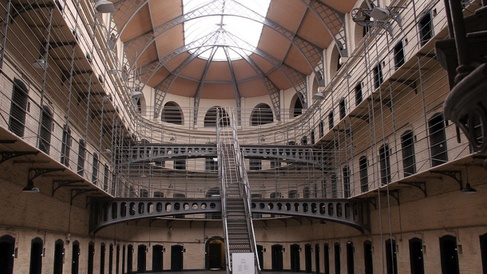Measuring the Quality of Prison Life - MQPL+

‘MQPL +’: Analyses of quality, culture, and values in individual prisons
Project Members:
During 2011, the PRC team refined a methodology we refer to as ‘MQPL +’. This arose in response to an increasing number of requests from individual establishments for a ‘cultural and quality’ diagnosis, often at short notice. The methodology reflects the way in which we tend to conduct MQPL surveys if we are doing this as part of a larger research project, with added qualitative components.
A short video introducing the MQPL prison survey can be seen here:
Please allow social and marketing cookies to show embedded content.
ESRC Prisons from David @ IMS Ltd. on Vimeo.
MQPL+ is an in-depth, intensively-conducted, descriptive analysis of the social environment for staff and prisoners in a prison establishment, using the conceptually validated version of the Measuring the Quality of Prison Life (MQPL) and Staff Quality of Life (SQL) surveys (also in use by NOMS), alongside detailed observation, and sensitive, appreciative interviews with staff and prisoners. The research exercise is conducted by a highly experienced team of at least six members of the research centre, who spend at least 70 person days in total conducting, analysing and writing up the work. Data analysis is carried out collaboratively, with data from many other prisons in mind, so that any cultural diagnosis of the prison is well informed and fully contextual. The empirical data and the written report provide senior managers with a thorough basis for understanding and improvement, and an assessment of effectiveness and progress. Each study is treated in a cumulative way, adding to our developing expertise in understanding and assessing prison quality and culture. Between 2011 - 2019, we conducted MQPL+ exercises at HMPs Brinsford, Birmingham (three times), Aylesbury (three times), Full Sutton (twice), Long Lartin, Frankland, Oakwood, Brixton, Durham, Humber, and other prisons. In addition, the Scottish Prison Service commissioned the PRC to conduct a longitudinal quality of life study in their newly opened prison, HMP YOI Grampian. Grampian is the UK’s first ‘community-facing’ prison and holds men, women, and young offenders. Fieldwork for this MQPL+ was conducted in March 2015, and 2016. The PRC team conducted a MQPL+ exercise in an Australian prison in Brisbane, Queensland, in October 2016.
Establishment Governors/Directors often request feedback meetings, as well as return visits one year later. These intensive research exercises are helping us to understand how prisons change over time, the relationship between staff and prisoner quality of life, the relative strengths and weakness of public, private, and benchmarked prisons, and the distinctive characteristics of (for example) high-security prisons and young offender institutions. An increasing number of requests have come to us from international jurisdictions wanting to use or adapt the MQPL survey for reform purposes (e.g. in Spain, Canada, Australia, Kosovo, Sweden, Belgium, and Northern Ireland). We try to support these requests wherever possible.
Analysis of the results is on-going (reports have been written for and distributed to each establishment) and our first Ministry of Justice Analytic Summary on the longitudinal study of Birmingham prison was published in July 2015 (see below). This study found that, after an initial decline in quality of life scores, particularly for staff, during the transition, the prison showed signs of positive progression by 2013. Seven prisoner quality of life dimensions improved significantly from 2011 to 2013. These improvements were accomplished against a low baseline. A great deal of work had been done by the Director and senior management team to reach this point. However, significant challenges in the delivery of a constructive regime remained.
We continue to explore the ways in which MQPL+ data can assist us in understanding institutional change trajectories, especially as national policy evolves, benchmarking processes settle in, new challenges arise, and local practices adapt.
Publications
Auty, K. and Liebling, A. (2020) 'Exploring the Relationship between Prison Social Climate and Reoffending', Justice Quarterly 37(2): 358-381.
Liebling, A., Johnsen, B., Schmidt, B.E., Rokkan, T., Beyens, K., Boone, M., Kox, K. and Vanhouche, A.S. (2020) 'Where two 'exceptional' prison cultures meet: Negotiating order in a transnational prison'. British Journal of Criminology.
Liebling, A., Laws, B., Lieber, E., Auty, K., Schmidt, B. E., Crewe, B., Gardom, J., Kant, D., Morey, M. (2019) 'Are Hope and Possibility Achievable in Prison?', The Howard Journal of Crime and Justice 58(1), 104-126.
Liebling, A., Skar, M., Lokdam, N., Muriqi, A., Haliti, D., Rushiti, F., & Modvig, J. (2019) ‘Quality of prison life, violence and mental health in Dubrava prison’. International Journal of Prisoner Health 15(3).
Liebling, A., Schmidt, B., Crewe, B., Auty, K., Armstrong, R., Akoensi, T., Kant, D., Ludlow, A. and levins, A. (2015) Birmingham prison: the transition from public to private sector and its impact on staff and prisoner quality of life - a three-year study. Ministry of Justice.
Liebling, A., Hulley, S. and Crewe, B. (2011), ‘Conceptualising and Measuring the Quality of Prison Life’, in Gadd, D., Karstedt, S. and Messner, S. (eds.) The Sage Handbook of Criminological Research Methods. London: Sage. This book chapter describes the initial and on-going development of the MQPL surveys.
Liebling, A., assisted by Arnold, H. (2004) Prisons and their Moral Performance: A Study of Values, Quality and Prison Life, Oxford: Clarendon Press.




